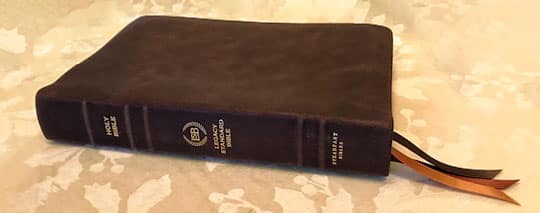Bible Question:
Are any of the English Bible translations 100% accurate? I have heard that some English translations of the Bible, like the King James, have been “interpreted” to fit the political climate or the desires of the ruling political parties at the time. Are any of the English translations 100% accurate when referring to the original Greek and Hebrew? I have been considering learning Greek and Hebrew myself for this reason.
Bible Answer:
Are any of the English Bible translations 100% accurate? The answer to the question is no. The English Bible translations are not 100% accurate to the original Greek. But that does not mean the sense or meaning is elusive. What follows is a brief explanation of why the Bible is trustworthy and inerrant. For a more complete explanation visit How Accurate Is the Bible?

Shades of Meaning
Translating from one language into another language will never be 100% accurate since some words require two or more words to communicate their meaning. For example, in the Greek language there are multiple words for love. The most common verb for love in the Bible is agapao. The common word for friend is phileo and the word for love between siblings is stergo. In the English language, there is only one word for love. Now how do our Bibles translate these three Greek words? They are all translated as “love.” Obviously, something is missing. Yet, to elaborate on the meaning of all the Greek words would explode the number of words and pages. We would then have enormous Bibles. Some words cannot ever be adequately translated into another language due to semantic range. Anyone who has tried to translate from one language into another has encountered this difficulty. That is, Bible translation requires skill and knowledge.
Missing Words, Sentences and Paragraphs
Another error that occurs in our Bibles is the result of uncertainty over a small set of words. That is, in a few places in our Bibles the exact wording has some doubt; however, the uncertainty is extremely small. For more information about textual criticism read “How Accurate Is The Bible?”
Faulty Translation Philosophy
Another error is a poor translation philosophy which states that a dynamic translation approach is best. That is, the translators were not committed to a word-for-word translation but a thought-for-thought translation. This poor translation philosophy requires the translator to interpret the meaning of the passage and then convey that meaning in the translation. That means the translation is already biased and is essentially a commentary. The New International Version (NIV) and the New Living Translation (NTL) are examples of this faulty translation philosophy. Consequently, these Bibles are not accurate and should be avoided by those who do not know Hebrew and Greek and seek to seriously study the Bible. The best translation philosophy for the Christian who is serious about Bible study is a word-by-word literal translation. The article “Preparing To Know What The Bible Says — best Bibles and more” is also recommended in the series How To Study the Bible.
Conclusion:
The short answer to the question, “Are any of the English Bible translations 100% accurate?” is our Bibles are 99.9% accurate. Different Bibles are more accurate to the original languages than others. Therefore, it is recommended that the serious Bible student purchase an LSB, ESV, NASB, or NKJV. The LSB is the Legacy Standard Bible, a 2021 update of the NASB. For a study Bible, we recommend the MacArthur Study Bible in either of the above versions.
Suggested Links:
How Accurate Is The Bible?What Bible would you recommend?
How do you decide which Bible to use?
Is The King James Bible The Best Bible?
How do you decide which Bible to use?
How many words are there in the Greek language for love?
Should we use other Bible passages to translate a verse?
Preparing To Know What The Bible Says — best Bibles and more